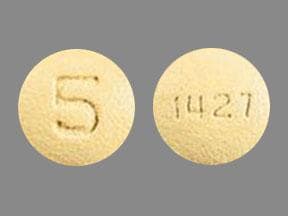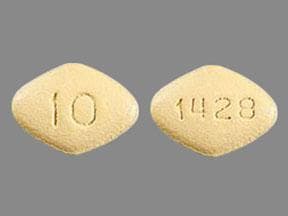What is dapagliflozin used for?
- Dapagliflozin is used to lower blood sugar in patients with high blood sugar (diabetes).
- It is used in certain people to lower the risk of having to go to the hospital for heart failure.
Before taking dapagliflozin, tell your doctor:
- If you are allergic to dapagliflozin; any part of this medicine; or any other drugs, foods, or substances. Tell your doctor about the allergy and what signs you had.
- If you have any of these health problems: Acidic blood problem or type 1 diabetes.
- If you have kidney disease.
- If you are dehydrated, talk with your doctor.
- If you are pregnant or may be pregnant. Do not take dapagliflozin if you are in the second or third trimester of pregnancy.
- If you are breast-feeding. Do not breast-feed while you take dapagliflozin.
This is not a list of all drugs or health problems that interact with dapagliflozin.
Tell your doctor and pharmacist about all of your drugs (prescription or OTC, natural products, vitamins) and health problems. You must check to make sure that it is safe for you to take dapagliflozin with all of your drugs and health problems. Do not start, stop, or change the dose of any drug without checking with your doctor.
What are some things I need to know or do while I take dapagliflozin?
- Tell all of your health care providers that you take dapagliflozin. This includes your doctors, nurses, pharmacists, and dentists.
- Do not drive if your blood sugar has been low. There is a greater chance of you having a crash.
- To lower the chance of feeling dizzy or passing out, rise slowly if you have been sitting or lying down. Be careful going up and down stairs.
- Have blood work checked as you have been told by the doctor. Talk with the doctor.
- This medicine may affect certain lab tests. Tell all of your health care providers and lab workers that you take dapagliflozin.
- Follow the diet and workout plan that your doctor told you about.
- If you are on a low-salt or salt-free diet, talk with your doctor.
- It may be harder to control blood sugar during times of stress such as fever, infection, injury, or surgery. A change in physical activity, exercise, or diet may also affect blood sugar.
- Check your blood sugar as you have been told by your doctor.
- Too much acid in the blood or urine (ketoacidosis) and severe urinary tract infections (UTIs) have happened. Ketoacidosis can be deadly. Both of these may need to be treated in a hospital.
- Kidney problems have happened. Sometimes, these may need to be treated in the hospital or with dialysis.
- Be careful in hot weather or while being active. Drink lots of fluids to stop fluid loss.
- If you cannot drink liquids by mouth or if you have upset stomach, throwing up, or diarrhea that does not go away; you need to avoid getting dehydrated. Contact your doctor to find out what to do. Dehydration may lead to new or worse kidney problems.
- A rare but very bad infection has happened with drugs like this one. This infection may be deadly. Get medical help right away if your genitals or the area between your genitals and rectum becomes tender, red, or swollen, and you have a fever or do not feel well.
- If you are 65 or older, use dapagliflozin with care. You could have more side effects.
- This medicine may cause harm to the unborn baby if you take it while you are pregnant. If you are pregnant or you get pregnant while taking dapagliflozin, call your doctor right away.
How is dapagliflozin best taken?
Use dapagliflozin as ordered by your doctor. Read all information given to you. Follow all instructions closely.
- Take with or without food.
- Take in the morning.
- Drink lots of noncaffeine liquids unless told to drink less liquid by your doctor.
- Keep taking dapagliflozin as you have been told by your doctor or other health care provider, even if you feel well.
What do I do if I miss a dose?
- Take a missed dose as soon as you think about it.
- If it is close to the time for your next dose, skip the missed dose and go back to your normal time.
- Do not take 2 doses at the same time or extra doses.
What are the side effects of dapagliflozin that I need to call my doctor about immediately?
WARNING/CAUTION: Even though it may be rare, some people may have very bad and sometimes deadly side effects when taking a drug. Tell your doctor or get medical help right away if you have any of the following signs or symptoms that may be related to a very bad side effect:
- Signs of an allergic reaction, like rash; hives; itching; red, swollen, blistered, or peeling skin with or without fever; wheezing; tightness in the chest or throat; trouble breathing, swallowing, or talking; unusual hoarseness; or swelling of the mouth, face, lips, tongue, or throat.
- Signs of fluid and electrolyte problems like mood changes, confusion, muscle pain or weakness, a heartbeat that does not feel normal, very bad dizziness or passing out, fast heartbeat, more thirst, seizures, feeling very tired or weak, not hungry, unable to pass urine or change in the amount of urine produced, dry mouth, dry eyes, or very bad upset stomach or throwing up.
- Signs of kidney problems like unable to pass urine, change in how much urine is passed, blood in the urine, or a big weight gain.
- Signs of too much acid in the blood (acidosis) like confusion; fast breathing; fast heartbeat; a heartbeat that does not feel normal; very bad stomach pain, upset stomach, or throwing up; feeling very sleepy; shortness of breath; or feeling very tired or weak.
- Signs of a urinary tract infection (UTI) like blood in the urine, burning or pain when passing urine, feeling the need to pass urine often or right away, fever, lower stomach pain, or pelvic pain.
- For females, vaginal yeast infection. Report itching or discharge.
- For men, yeast infection of the penis. Report pain, swelling, rash, or discharge.
- Low blood sugar can happen. The chance may be raised when dapagliflozin is used with other drugs for diabetes. Signs may be dizziness, headache, feeling sleepy or weak, shaking, fast heartbeat, confusion, hunger, or sweating. Call your doctor right away if you have any of these signs. Follow what you have been told to do for low blood sugar. This may include taking glucose tablets, liquid glucose, or some fruit juices.
What are some other side effects of dapagliflozin?
All drugs may cause side effects. However, many people have no side effects or only have minor side effects. Call your doctor or get medical help if any of these side effects or any other side effects bother you or do not go away:
- Nose or throat irritation.
These are not all of the side effects that may occur. If you have questions about side effects, call your doctor. Call your doctor for medical advice about side effects.
You may report side effects to the FDA at 1-800-332-1088. You may also report side effects at https://www.fda.gov/medwatch.
If overdose is suspected:
If you think there has been an overdose, call your poison control center or get medical care right away. Be ready to tell or show what was taken, how much, and when it happened.
Dapagliflozin Images
How do I store and/or throw out dapagliflozin?
- Store at room temperature in a dry place. Do not store in a bathroom.
- Keep all drugs in a safe place. Keep all drugs out of the reach of children and pets.
- Throw away unused or expired drugs. Do not flush down a toilet or pour down a drain unless you are told to do so. Check with your pharmacist if you have questions about the best way to throw out drugs. There may be drug take-back programs in your area.
Consumer information use and disclaimer
- If your symptoms or health problems do not get better or if they become worse, call your doctor.
- Do not share your drugs with others and do not take anyone else's drugs.
- This medicine comes with an extra patient fact sheet called a Medication Guide. Read it with care. Read it again each time dapagliflozin is refilled. If you have any questions about dapagliflozin, please talk with the doctor, pharmacist, or other health care provider.
- If you think there has been an overdose, call your poison control center or get medical care right away. Be ready to tell or show what was taken, how much, and when it happened.
This information should not be used to decide whether or not to take dapagliflozin or any other medicine. Only the healthcare provider has the knowledge and training to decide which medicines are right for a specific patient. This information does not endorse any medicine as safe, effective, or approved for treating any patient or health condition. This is only a brief summary of general information about this medicine. It does NOT include all information about the possible uses, directions, warnings, precautions, interactions, adverse effects, or risks that may apply to dapagliflozin. This information is not specific medical advice and does not replace information you receive from the healthcare provider. You must talk with the healthcare provider for complete information about the risks and benefits of using this medicine.






